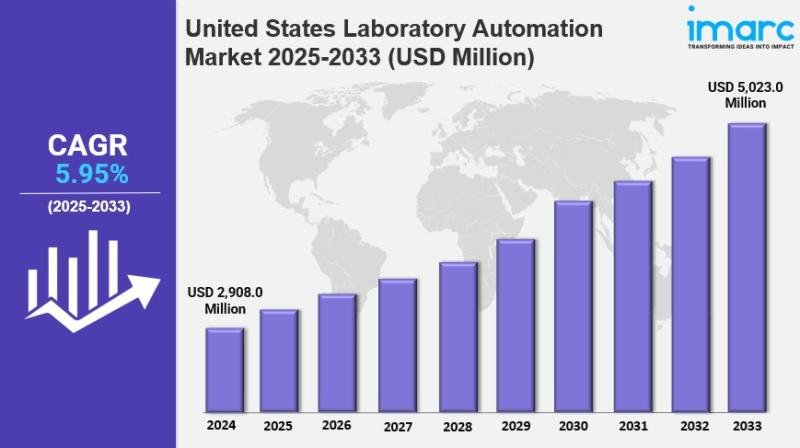
Market Overview 2025-2033
The United States laboratory automation market size reached USD 2,908.0 Million in 2024. Looking forward, IMARC Group expects the market to reach USD 5,023.0 Million by 2033, exhibiting a growth rate (CAGR) of 5.95% during 2025-2033. The market is witnessing significant growth, fueled by rising demand for high-throughput screening, technological advancements, and a growing focus on reducing human error. Key trends include the integration of AI and robotics, with leading companies emphasizing workflow efficiency and customizable automation solutions.
Key Market Highlights:
✔️ Strong market expansion driven by demand for efficient and accurate diagnostics
✔️ Growing adoption of advanced robotics and AI in laboratory workflows
✔️ Rising need for high-throughput systems in clinical and pharmaceutical research
✔️ Emphasis on minimizing manual errors and improving productivity
✔️ Surge in investments toward smart lab infrastructure and automation platforms
Request for a sample copy of the report: https://www.imarcgroup.com/united-states-laboratory-automation-market/requestsample
United States Laboratory Automation Market Trends and Drivers:
One of the primary dynamics driving the United States laboratory automation market is the increasing demand for efficiency and productivity in laboratory operations. As laboratories face growing pressure to deliver swift and accurate results, automation technologies have become essential for streamlining workflows and minimizing human error. Solutions such as robotic systems, liquid handling platforms, and automated sample processing enable laboratories to manage high-throughput tasks more effectively, significantly reducing the time needed for experiments and analyses.
This shift toward automation not only enhances operational efficiency but also allows laboratory personnel to focus on more complex and value-added activities, such as data analysis and interpretation. Additionally, the rising trend of personalized medicine and the heightened need for rapid diagnostic testing have further intensified the demand for automated laboratory solutions. By 2025, the emphasis on efficiency and productivity is expected to drive substantial growth in the laboratory automation market, as organizations increasingly recognize the benefits of integrating advanced technologies into their workflows.
The landscape of the laboratory automation market in the United States is being transformed by advancements in robotics and artificial intelligence (AI). Innovations in robotic systems, including collaborative robots (cobots) and autonomous mobile robots (AMRs), are enhancing laboratory automation capabilities by enabling more flexible and adaptable workflows. These robots can work alongside human operators, assisting with repetitive tasks and promoting greater efficiency in laboratory processes. Furthermore, the integration of AI and machine learning technologies into laboratory automation systems optimizes experimental design, data analysis, and decision-making processes.
This integration not only accelerates research efforts but also improves the accuracy and reliability of results. By 2025, the ongoing evolution of robotics and AI is anticipated to significantly impact the laboratory automation market, as organizations strive to leverage these technologies to enhance their research capabilities and maintain a competitive edge in the rapidly evolving scientific landscape.
Another critical dynamic influencing the United States laboratory automation market is the increasing focus on regulatory compliance and quality assurance. Laboratories across various sectors, including pharmaceuticals, biotechnology, and clinical diagnostics, must adhere to stringent regulations that require compliance with quality standards and best practices. Automation solutions are increasingly adopted to ensure adherence to these regulations by standardizing processes, maintaining accurate records, and reducing the risk of human error.
Automated systems provide real-time monitoring and data logging, facilitating compliance with Good Laboratory Practice (GLP) and other regulatory requirements. As laboratories work to improve their quality management systems, the demand for automated solutions that support compliance efforts is expected to rise. By 2025, the emphasis on regulatory compliance and quality assurance will continue to shape the laboratory automation market, as organizations seek to mitigate risks and ensure the integrity of their research outcomes.
The United States laboratory automation market is characterized by a dynamic and rapidly evolving landscape, marked by a growing emphasis on efficiency, technological advancements, and regulatory compliance. As laboratories increasingly strive to enhance productivity and reduce turnaround times, the adoption of automation solutions is becoming more widespread. By 2025, the market is projected to experience significant growth driven by innovations in robotics and artificial intelligence, which are transforming traditional laboratory workflows and enabling more sophisticated data analysis. The integration of these advanced technologies allows laboratories to improve accuracy and reliability while freeing personnel to focus on higher-value tasks.
Moreover, the heightened focus on regulatory compliance is prompting laboratories to invest in automated systems that facilitate adherence to quality standards and best practices. This convergence of trends positions the laboratory automation market for sustained growth, as organizations recognize the critical role of automation in maintaining competitiveness and advancing scientific research in an increasingly complex environment. As the market evolves, the synergy between technological innovation and regulatory requirements will continue to drive the adoption of automation solutions, shaping the future of laboratory operations.
Buy Report Here: https://www.imarcgroup.com/checkout?id=2538&method=1190
United States Laboratory Automation Market Segmentation:
The report segments the market based on product type, distribution channel, and region:
Study Period:
Base Year: 2024
Historical Year: 2019-2024
Forecast Year: 2025-2033
Breakup by Type:
• Modular Automation
• Whole Lab Automation
Breakup by Equipment and Software Type:
• Automated Clinical Laboratory Systems
o Workstations
o LIMS (Laboratory Information Management Systems)
o Sample Transport Systems
o Specimen Handling Systems
o Storage Retrieval Systems
• Automated Drug Discovery Laboratory Systems
o Plate Readers
o Automated Liquid Handling Systems
o LIMS (Laboratory Information Management Systems)
o Robotic Systems
o Storage Retrieval Systems
o Dissolution Testing Systems
Breakup by End User:
• Biotechnology and Pharmaceutical Companies
• Hospitals and Diagnostic Laboratories
• Research and Academic Institutes
Breakup by Region:
• Northeast
• Midwest
• South
• West
Ask Analyst & Browse full report with TOC & List of Figures: https://www.imarcgroup.com/request?type=report&id=2538&flag=C
Competitive Landscape:
The market research report offers an in-depth analysis of the competitive landscape, covering market structure, key player positioning, top winning strategies, a competitive dashboard, and a company evaluation quadrant. Additionally, detailed profiles of all major companies are included.
About us:
IMARC Group is a global management consulting firm that helps the world’s most ambitious changemakers create lasting impact. The firm offers comprehensive services for market entry and market expansion.
IMARC’s services include thorough market assessments, feasibility studies, company formation assistance, factory setup support, regulatory approvals and license navigation, branding, marketing and sales strategies, competitive landscape and benchmark analysis, pricing and cost studies, and sourcing studies.
Contact Us:
IMARC Group
134 N 4th St. Brooklyn, NY 11249, USA
Email: [email protected]
Tel No:(D) +91 120 433 0800
United States: +1-631-791-1145
This release was published on openPR.



